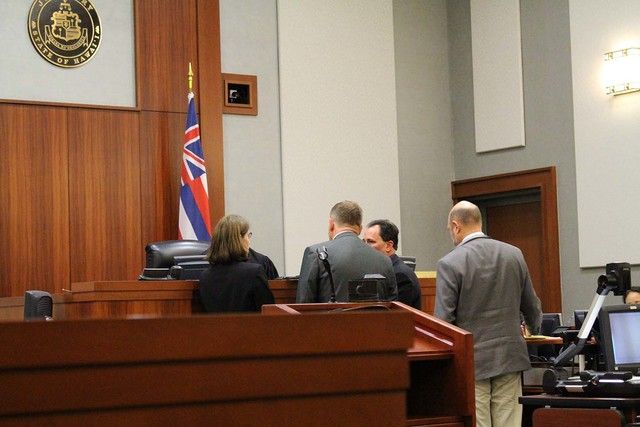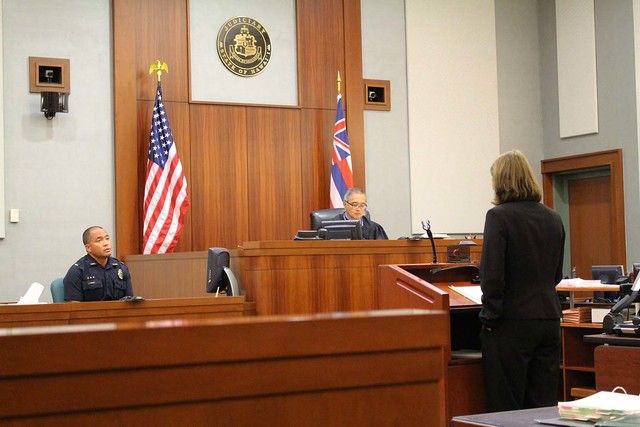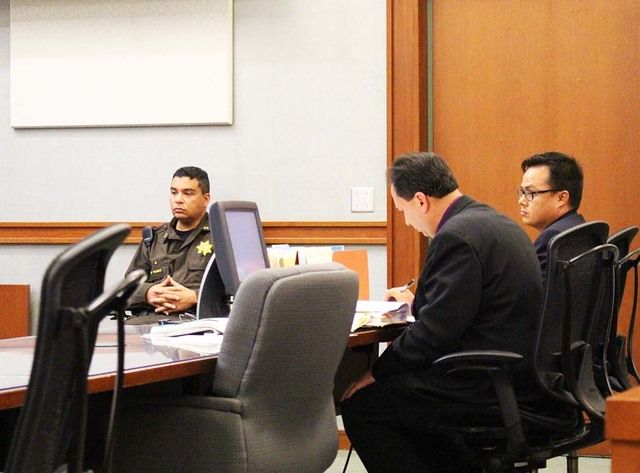LIHUE — A motion to declare a mistrial by the defense in a case where a man is accused of sexually assaulting his 6-year-old stepdaughter 20 years ago was denied Tuesday. Steven Westerman, 40, is charged with six counts of
LIHUE — A motion to declare a mistrial by the defense in a case where a man is accused of sexually assaulting his 6-year-old stepdaughter 20 years ago was denied Tuesday.
Steven Westerman, 40, is charged with six counts of first-degree sexual assault in the October 2012 indictment, which alleges he knowingly engaged in sexual penetration with his stepdaughter, between June 1995 and May 1997.
The defense’s motion came after the state introduced an additional sexual incident or encounter during the alleged victim’s testimony, making the total number of incidents seven instead of six.
The judge said sometimes there are incidents where the victim can refer to “multiple acts,” and in this case that’s what happened, so he denied the motion.
“We have incidents where we have multiple acts,” said Fifth Circuit Court Chief Judge Randal Valenciano. “One of the issues that we had is the way the matter is charged. The court believes that the state has introduced evidence with the counts. The court’s intent when issuing the order was not to overload the information that was being presented to the jury and it didn’t create that type of prejudice to the defendant.”
During pretrial conference, the parties had agreed to not introduce any alleged misconduct that was not in the indictment or that was not charged in the case.
But during Tuesday’s trial, first deputy prosecuting attorney Jennifer Winn said the incident was related to two separate acts that occurred in the same place, the defendant’s bedroom where he lived with victim and her mother.
Three witnesses took the stand at Tuesday’s trial: the victim of the alleged abuse, Kauai Police Department Lt. Todd Tanaka and Dr. Alex Bivens.
During her testimony, the now 26-year-old victim described multiple incidents of alleged sexual abuse during the time she said Westerman lived with her and her mother in Kekaha low-income housing.
She said her relationship with her stepfather was “not good” because he was molesting her and that the abuse did not stop until he left for the military in 1997.
In her testimony, the victim described graphic details about what allegedly occurred on several occasions between her and her stepfather while her father, who she said worked a lot, was out of their two-bedroom home. She was six years old and she said he told her the abuse “was our little secret.”
In one instance, Winn asked her to clarify what she meant when she said that sometimes she would “blank out” during the abuse.
She said she meant she would “find a place to take you away from what’s really happening.”
The revelation of allegations of abuse came when the victim was 16 years old. She revealed them to her mother during a heated argument when her mother would not allow her to live with her father, according to the victim’s testimony.
Defense Attorney Craig De Costa asked her if she had ever expected to see Westerman again at the time that she revealed the alleged abuse. She replied she had not expected to see him again.
De Costa called the alleged victim’s memories “tainted” because of the amount of interviews she had been through and said that some of her memories or her recollections might have been suggested to her by police or counselors.
The victim has spoken to counselors, police officers, detectives, her parents, prosecutors and the courts, according to her testimony.
Tanaka interviewed her twice, once in 2005 and again in 2007, according to his testimony. In 2005, he said the victim did not want to pursue the case and he did not make any attempts to find Westerman.
In 2007, he once again connected with the victim and this time, during his interview with her, she referred to four sexual incidents with Westerman.
“Would you agree it’s important to not be suggestive about what actually happened and to allow the person to come forward with what actually happened?” De Costa said to Tanaka referring to his 2007 interview with the victim.
“Yes,” Tanaka said.
De Costa asked Tanaka if he had possibly suggested to the victim the idea of sexual penetration to which Tanaka replied he had because the victim had used the word “raped” and wanted her to clarify.




